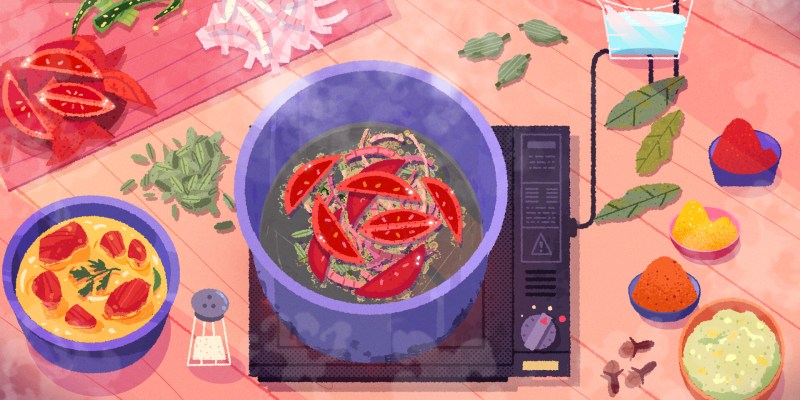A husband prepares to head to work without lunch. But we can’t have that. That’s how the demo for Venba, included as part of the ongoing Steam Next Fest, begins. Our protagonist Venba, the unwell wife of Paavalan, drags herself from the couch, determined that neither of them will spend the day hungry. Maybe it’s a clichéd premise, but it speaks to the central role that food and cooking plays in many cultures — and that sense of sharing, of community found through food is made even more clear by the demo’s end a short 15 minutes later.
It’s a sentiment that you’ll also find in the madcap, co-op-centered Overcooked series, though Venba’s approach is far more sincere. The structure is a little reminiscent of the Coffee Talk series in the way it juxtaposes narrative sequences with gentle, puzzle-like gameplay segments. Here, though, the story is firmly grounded in ideas of family, and rather than trying to get coffee orders right, you’re crafting recipes using unfamiliar utensils and a stained recipe book. At points, the cooking instructions are obscured by the remains of some long-ago meal, which means there are inevitable moments of trial and error.

Having key lines covered up is incredibly convenient for the developers, of course, but it’s also true to what Venba is about — at least in this demo. I remember that my nonna had a book just like this one when I was growing up, the handwritten recipes stained by ancient flour, tomato paste, or random liquid splatters. I remember looking over the recipes with her and rolling potato dough into long sausages in the name of helping her make gnocchi. They’re among my fondest memories, and that love of food is something that persists. Whether it’s cooking alongside my partner or discussing meals and ingredients with colleagues, there’s a communal joy to be found in sharing both the act and the creations of cooking.
The recipe book in Venba isn’t some random store-bought thing. It’s an heirloom passed down from Venba’s mother, and Venba consults it in that moment for comfort. She has her own idli recipe, but she remembers that her mother’s were softer, better. And although the demo isn’t clear about the fate of Venba’s mother, it’s clear that she’s not currently in the picture. Venba and Paavalan are Indian migrants living in Canada. However, the economic challenges have them reconsidering whether they can continue in this far-flung country. Perhaps, then, the decision to refer to the recipe book rather than just making her usual fare isn’t just about comfort. Maybe it’s also a way of communing across space and time, interrogating her ancestry to ask whether it’s better to forge ahead into uncertainty or put faith in the constancy of the past.

I don’t share Venba’s cultural background, but the idea still resonates strongly with me. When I cook the recipes left to me by my nonna, I can’t help but think of her and my nonno: of school holidays spent in their swimming pool, of playing red rover with the kids in their neighborhood, of Sunday morning mass, of getting locked in their house with an active alarm system, of pumpkin scones served al fresco on the patio, of cakes and risotto and polenta and minestrone and pasta and enormous Christmas dinners. Venba makes me think of exactly the same things because I wonder about Venba and her relationship with her mother. Were they close? Why did she move to Canada? Why does she have the recipe book? Did they bond over the food that lives between those battered pages?
But the Venba demo has one last thing to say. If you choose to start it, you’ll probably be able to guess immediately what happens, but I won’t spoil it here. What I will say is that it transforms the metaphysical questions about the role of cooking in human relationships into a literal conversation piece. When I read about how almost a third of Americans don’t (or can’t) cook, it’s baffling. I’m sure there are very good reasons for the decline of cooking in the modern West, but I’m curious: What replaces it? Food is more than just some ephemeral linkage between people across space and time through memory; it can also be a vehicle for direct communication, if only we know how to read it. And Venba promises to telegraph that beautifully when it releases at the end of July 2023.
